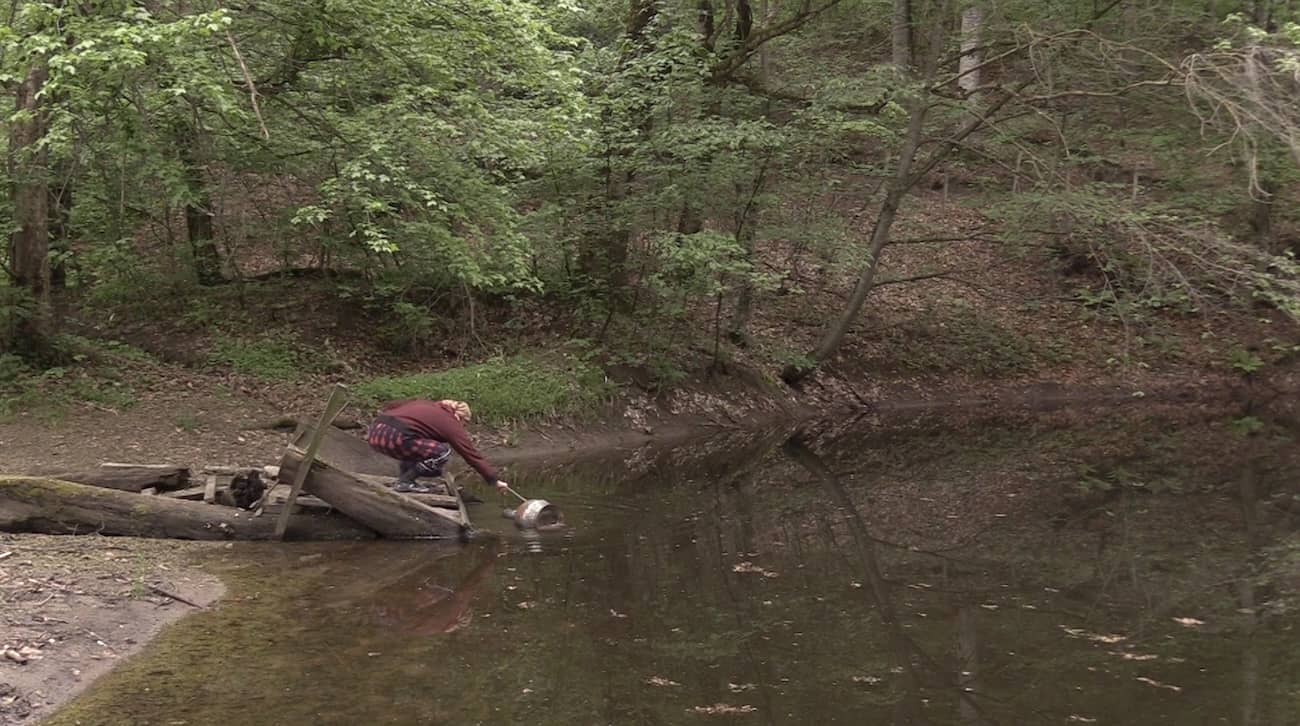Seeing & Being Seen: Female Gaze
on the occasion of the exhibition Acts of Conflations, we cordially invite you and your friends to the screening evening:
SEEING & BEING SEEN: FEMALE GAZE
In Contemporary Azerbaijani Documentary Cinema
conceived by Aysel Akhundova
Saturday, 20 September, 7–9 pm
Galerie AC. Art & Dialogue
Donaustraße 84, 12043 Berlin

My Grandfather’s House, 2023 by Leylakhanim Gambarli (24′)
The Moon Without a House, 2024 by Atanur Nabiyeva (22′)
They Whisper But Sometimes Scream, 2020 by Lala Aliyeva (21′)
Pathway to Peace, 2024 by Nargiz Mammadli (23′)
All films are in Azerbaijani language with English subtitles.
The screening will be followed by a conversation between artist–filmmaker Aysel Akhundova and journalist and media critic Pari Abbasli.
Kindly follow us on Instagram and subscribe to our newsletter for updates.
Documentary cinema finds itself in a moment of transformation. Where once the form was bound by rigid notions of reality, or rather representing, it today’s practitioners embrace the personal, the lyrical, the speculative. They understand that reality itself is layered, that truth emerges not through distant observation but through intimate engagement, through what we might call the artist’s complicity with their subject.
This evolution has not bypassed Azerbaijani cinema, where a distinctly poetic voice has begun to reshape the documentary landscape. Here, women filmmakers approach reality with an empathy that transforms seeing into feeling, documentation into reflection. Their cameras move like hands tracing memory, and their narratives unfold like whispered confidences.
It is perhaps no accident that this emergence happens within documentary rather than fiction. The form demands less capital but offers greater freedom, freedom to follow intuition and to let the story breathe. In a landscape where women’s stories have long been filtered through other lenses, documentary becomes a space of reclamation.
We present three short films that exemplify this new gaze: Leylakhanim Gambarli’s My Grandfather’s House, Atanur Nabiyeva’s The Moon Without a House, and Lala Aliyeva’s They Whisper But Sometimes Scream. Each work draws us into conversation with the elemental, with family, nature, and earth acting as confidants, and breaking the borders between real and fairytalelike.
Their cameras become instruments of archaeology, unearthing what lies buried in the familiar. We follow them expecting discovery, anticipating the revelation of new worlds. Instead, we encounter something more unsettling and more precious: recognition. In their patient attention to the everyday sacred, these women offer us mirrors. We find ourselves looking back from the screen: seen, witnessed, acknowledged in our searching. This is the particular gift of the female gaze in documentary: it refuses the comfortable distance between observer and observed. It insists on presence, on the vulnerability of true seeing. In the end, we leave these films not merely informed but touched, carrying within us the quiet certainty that we have been, for a moment, fully here.
Synopses:
My Grandfather’s House, 2023 by Leylakhanim Gambarli (24′)
Eleven years after her grandfather’s passing, director Leylakhanim Ganbarli starts an emotional journey. She has never had the courage to say “farewell” to her late grandfather until now. Filled with valuable memories of their time together, she travels from Baku to Oglangala, her childhood village in Nakhchivan. As she reflects on her grandfather and awakens memories of him, her grandmother steps in to support her, marking a new, changed, more profound relationship between them.
The Moon Without a House, 2024 by Atanur Nabiyeva (22′)
The filmmaker returns to her village, at the foot of the Avey mountain in Azerbaijan. The mountain is disappearing, swallowed up by quarries, and with it her memories of childhood. Once there, she films the relationship between a young girl and her grandmother; their daily life, and the tenderness that unites them. Mirroring this are her memories, together weaving a poetic tale.
They Whisper But Sometimes Scream, 2020 by Lala Aliyeva (21′)
In northern Azerbaijan, women come to a local lake to collect water, speaking to themselves, and speaking to the water. Director Lala Aliyeva embarks on an intuitive journey, weaving testimonies of spirit possession and maternal struggle with the natural soundscapes. As she films, the lake transforms into a sacred repository of collective memory, where exhausted and fearful voices find release. The film captures the profound interconnection between human and non-human agencies, exploring how landscape absorbs and preserves memories and history.
Pathway to Peace, 2024 by Nargiz Mammadli (23′)
Nargiz, a young Azerbaijani filmmaker caught between the traditions of her upbringing and the rapidly changing world, begins to unpack her complicated relationship with her parents as she seeks peace and self-acceptance in her own life. Nargiz tries to find a common understanding with her parents through conversations about their feelings and Soviet-influenced past.
Speakers:
Pari Abbasli (she/her) is a journalist and media enthusiast with a background in journalism, media, and digital literacy. She has worked with Sevil International Women’s Documentary Film Festival held in Baku, Azerbaijan for three years.
Aysel Akhundova (she/her) is a creative producer and multidisciplinary artist. She is currently producing her first feature-length film. Aysel has organized the first two editions of a grassroots international independent film festival in her hometown of Baku, Azerbaijan, and was engaged in feminist publishing as part of the Femiskop collective.